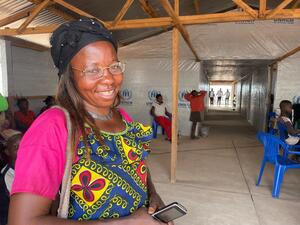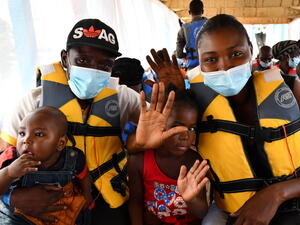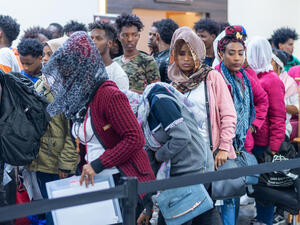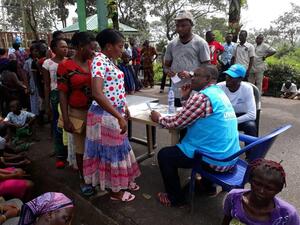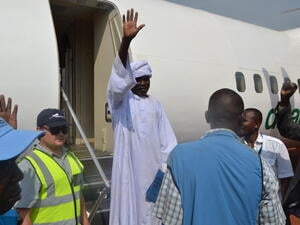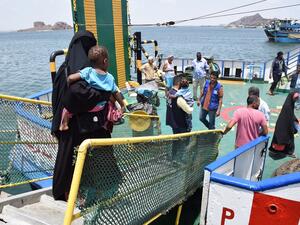New repatriation programme launched, as ferry takes Congolese home to South Kivu
New repatriation programme launched, as ferry takes Congolese home to South Kivu

Refugees returning home from the DRC across Lake Tanganyika during the first trial run in October.
BARAKA, DRC, November 11 2005 (UNHCR) - Waved off on one shore of the world's longest lake with colourful flags, and received six hours later on the opposite shore with noisy cheers, nearly 500 Congolese refugees went home this week as UNHCR officially launched its repatriation programme to the South Kivu region of the Democratic Republic of the Congo (DRC).
"I am tired of life in the refugee camp," said a young man as he helped his wife and two children off the ferry, MV Mwongozo, in Baraka on the shores of Lake Tanganyika on Thursday morning. "Even if conditions are not optimal here in South Kivu, it is still better than to sit around far away from home."
For more than seven years, Tanzania has provided asylum to some 155,000 Congolese refugees who fled fighting in the eastern DRC regions of North and South Kivu. Now the way is open for them to come home.
"I am glad to contribute to positive developments in the DRC. At the same time much remains to be done to improve the security conditions and overall stability in South Kivu," cautioned UNHCR Representative in DRC, Eusebe Hounsokou, at the welcoming ceremony in Baraka.
The official launch of the repatriation operation came after four trial efforts, starting in mid-October, brought more than 1,500 refugees home from camps in north-western Tanzania.
With the trial runs judged successful, on Wednesday another 484 refugees were transported by truck from Nyarugusu camp in Kasulu District to Kigoma, some three hours away. Following an early evening ribbon-cutting ceremony, refugees carrying the DRC flag boarded the ferry for the overnight journey across Lake Tanganyika, on the UNHCR-chartered MV Mwongozo.
On Thursday morning, following the six-hour crossing, the returnees were greeted in Baraka - at a port reconstructed by UNHCR - by hundreds of local residents loudly cheering the return of their relatives and former neighbours. Tanzanian government officials, who had sailed across the lake with the refugees, led the first families off the ferry and ceremoniously handed them over to DRC officials.
"We are sincerely grateful to UNHCR for assisting our people to regain their country," said DRC Minister of Interior Theophile Mbemba, who travelled the 1,800 kilometres from Kinshasa to South Kivu to personally welcome the returnees. He was joined by a large delegation of donor government representatives, journalists and UN officials.
In Baraka, where they spent the following night, the returnees got a hot meal and were warned to be wary of landmines in their home villages, fields and forests, before being taken on trucks to their home villages in South Kivu on Friday. They were also given cooking pots, mattresses and farm and construction tools to enable them to rebuild their lives.
Many of the returnees said they were eager to get back to their homeland as DRC prepares for elections next year. Others complained of reduced food rations and having nothing to do in the camps in Tanzania.
Because of the difficult choices faced by refugees in Tanzania, the UN refugee agency started a mass information campaign in the three large refugee camps holding Congolese refugees ahead of the launch of the organized repatriation. Publications issued in both French and Kiswahili feature interviews with residents of South Kivu and information about existing aid programmes, as well as about the problems returnees will face.
"I believe refugees should know about the reality of life in South Kivu, especially with regard to security and the possibility to make a living." said David Nthengwe, UNHCR's Mass Information Officer in charge of the information campaign for refugees.
The name of the ship that brought the refugees home - Mwongozo - means 'leading the way' in Kiswahili, and the refugees have in fact led the way on this repatriation.
"Last year refugees already started returning home on their own in unsafe boats - some 15,000 went home on their own - so we felt it prudent to help them by organizing proper transportation," UNHCR spokesman Ron Redmond told journalists in Geneva on Friday. The organized repatriation was made possible by the signing of a Tripartite Agreement in September by UNHCR and the governments of DRC and Tanzania.
It's not the first time boats have proved to be the best way to help Congolese refugees return home. In another unusual organized repatriation that began in April this year, Congolese refugees returned to Equateur Province in the north-west of the DRC, travelling along the Oubangui river through the equatorial rainforest on specially made wooden boats - so called 'balenaires,' or whaling boats.
Using the MV Mwongozo has resulted in cutting nine hours off what used to be a 15-hour journey when refugees chartered their own small boats. And, unlike the small river boats used in Equateur province, the MV Mwongozo is a large iron ferry that is sufficiently sturdy to navigate its way safely across the sea-like waters of Lake Tanganyika.
Although it is the second-deepest lake in the world (after Lake Baikal in Russia), the water level in Lake Tanganyika is at present extraordinarily low. This means the ship is not able to dock at the Kigoma pier on the Tanzanian side, and a smaller boat is having to be used to ferry the refugees out to the MV Mwongozo.
"We are trying to arrange for floating pontoons to make the boarding process easier," Redmond said in Geneva. If enough money is available to sustain the repatriation programme, UNHCR expects to continue to bring home at least one boatload of up to 500 refugees every week over the coming months. Ideally, it would like to double that number by organizing two sailings a week, Redmond said.
By Jens Hesemann in Baraka, DRC
with Mia Bülow-Olsen in Tanzania

